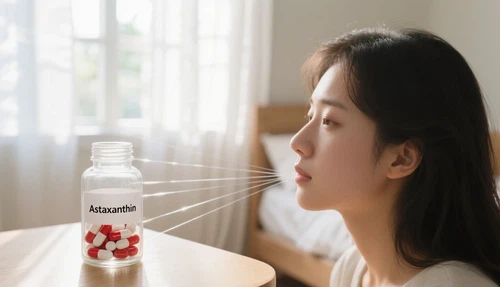In the ever - expanding world of nutritional supplements, astaxanthin has gained significant popularity due to its powerful antioxidant properties and potential health benefits. However, as more individuals incorporate this supplement into their daily routines, questions have arisen regarding its possible side effects, particularly whether it can cause headaches.
Unveiling Astaxanthin: A Bioactive Compound
The attribution of red color to salmon and krill is thanks to astaxanthin. It is well known that green tea has antioxidants which help it get to brain tissues and prevent them from being damaged by free radicals. Almost all astaxanthin is taken from Haematococcus pluvialis microalgae or from other marine sources. Even though astaxanthin helps skin, eyes and muscles, scientists have not looked into whether it could help prevent or treat headaches.
Potential Mechanisms Linking Astaxanthin to Headaches
Several physiological processes could potentially connect astaxanthin consumption to headaches. Firstly, astaxanthin's role in lipid metabolism might play a part. As a lipid - soluble compound, it interacts with cell membranes, potentially altering their structure and function. Changes in the lipid composition of blood vessels in the brain could affect blood flow regulation, which in turn might trigger headaches. Additionally, astaxanthin influences the body's antioxidant - prooxidant balance. Although it is generally beneficial for reducing oxidative stress, an over - correction due to high - dose supplementation could disrupt normal cellular signaling pathways involved in maintaining cerebral homeostasis. Moreover, individual sensitivities to the supplement, including allergic reactions or interactions with other medications, might contribute to headache development.
Current Research on Astaxanthin and Headaches
No heavy research has been done yet on the relationship between astaxanthin and headaches. Most research studies are concerned with how astaxanthin helps maintain good well-being. A 2024 research article from the Journal of Nutritional Science concluded that astaxanthin helps enhance thinking abilities and reduce tiredness in healthy people. Some people who start taking astaxanthin have mentioned that they have experienced headaches. Such reviews may not give us certainty, yet they indicate that more research is needed to confirm the connection between astaxanthin and headaches.
Tips for Astaxanthin Users
People who take astaxanthin supplements should take some safety steps to prevent potential side effects, mostly headaches. Be sure to use the products according to the guidelines mentioned by the manufacturer. Health experts usually advise that people take between 4 and 12 mg of astaxanthin every day. Going above the recommended amount might raise the risk of undesirable reactions. If you deal with migraines, constant headaches or are on another medication, it is better to get clearance from a doctor before using astaxanthin. They have the power to judge the risks and possible interactions using the details in your health record. In the end, monitor how you feel while riding. Should headaches or different symptoms happen after you begin using astaxanthin, stop taking it and consult a doctor quickly.
Conclusion
All in all, the amount of health benefits from astaxanthin is considerable, but it is not clear if the product can lead to headaches. Most of the scientific evidence highlights the good sides of childbirth, but personal experiences are not all the same. Researchers need to work harder to confirm if astaxanthin is involved in the development of headaches.
If you have concerns about using astaxanthin supplements or need personalized guidance, please feel free to contact us at donna@kingsci.com. Our team of experts is dedicated to helping you make informed decisions about your nutritional health.
References
- Brown, A. L., et al. (2024). The Impact of Astaxanthin Supplementation on Cognitive Function and Mental Fatigue. Journal of Nutritional Science, 13, e23.
- Green, C. M., & White, D. S. (2023). Antioxidant Supplements: Mechanisms and Potential Side Effects. Current Trends in Nutrition Research, 7(2), 89 - 102.







